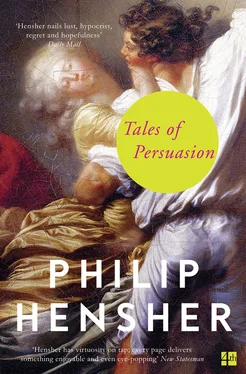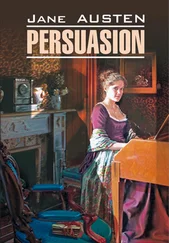‘Oh, yes, lovely,’ Silvia said. ‘Where do you live? You live alone?’
‘Quite near here,’ I said. I went on to tell her – there was not much to tell, but I told her about the rented flat at the top of a big Victorian house, converted for four single people by the Irish doctor who owned it; the dingy communal spaces, with the floral wallpaper no one had chosen, the half-dead spider plants, the solitary undusted china ornaments, Irish cast-offs, a chipped and smiling Edwardian lady in her china skirts at each turning of the stair, the mail for departed tenants piling up in the hall.
‘Oh, that sounds nice,’ Silvia said dismissively. She abruptly looked at her watch – ‘Heavens,’ she said. The watch was so tiny and so heavily jewelled you could not imagine using it to tell the time from, but Silvia said, ‘I nearly forgot. I call my mother.’
‘Not in the museum,’ I said, gesturing at the woolly mammoth’s tooth. But no one was around, and Silvia whipped her mobile phone out pooh-poohingly.
‘ Mamma ,’ she said. ‘ Come stai? … Bene, bene. Fa freddo – sta piovendo … Si, si, sempre. E Papa? … E Luca sta bene? … E Luigi? … E Roberto? … Mauro anche? … Massimo? … Va bene, va bene, ci parliamo domani, va bene? … Ciao ciao, Mamma. ’
She switched off. I later learnt that Silvia made this exact phone call, at exactly the same time, every single day of her life. She said that it was raining in England, she found out what the weather was like in Italy, and she asked after the health of her father and, in order, her five unstoppable brothers, Luca, Luigi, Roberto, Mauro and Massimo, twenty-two years old down to five, before promising to telephone at the same time the next day for the same purpose. It seemed strange to me, who in the English way called his mother once a fortnight or so. I rarely had much more to say than Silvia, but the embarrassment happened much less frequently. Silvia, I guessed at the time, might be homesick. That was not, however, the case.
And a week or so later, sitting in a pub in the early evening, she continued this conversation about her room and told me about the Australian professor of theology. For some reason, I had thought that he was a single man, but I learnt that he had a wife and three children, two sons and a daughter. By the end of that evening, Silvia had invited me to dinner, the day after next, at their house.
‘I would say tomorrow night but, you know, it’s not my house. I can’t tell them until tomorrow morning, I need to give them a day or two, you understand? Listen, you like Italian food? I cook you an Italian dinner.’
All afternoon the next day I felt feverishly burgeoning, down in my windowless office at the museum. I felt like a nineteenth-century girl in a Swedish film, throwing off my corsets and discovering my sexuality.
‘We missed you,’ Margaret said, sidling through the door with a clipboard.
‘Oh, Christ,’ I said. ‘It was the— Christ, what was it?’
‘The education and outreach committee’s budget meeting,’ she said. ‘It’s been in all our diaries for weeks.’
‘I knew there was something,’ I said.
‘There was indeed,’ she said. ‘There was something, you’re right there.’
‘That’s a catastrophe,’ I said. ‘I don’t know how I could have forgotten it.’
‘You’ll get the minutes,’ she said. ‘Don’t be hard on yourself.’
Of course she was right: people missed meetings all the time. It wasn’t that she was concerned about me. She could just tell that something new had come into my life; it would have taken a bright guess to alight upon Silvia, but Margaret, hovering in the door of my office, could tell it was something of that sort. She just wanted to know. I just wanted not to tell her.
The professor of theology was called Professor Quincy. He lived, I discovered, in an absurd villa in the opulent inner suburbs of the city. The street was lined with vast, ancient beeches, never intended by the Victorian planners to grow to such a size. Their foliage met and struggled overhead, and the pavement writhed and buckled over the roots like a late chapter of Moby-Dick . In other cities, to live in a Victorian house of this sort would require some wealth. These houses had been built for ruinous, grasping magnates, but a hundred years on, few people in the city had much money at all, and they were lived in by mere professors of theology. Quincy’s house had crenellations, battlements in the local orange stone, stained glass in the oddest places. In the street, two small girls were playing an unnecessarily picturesque game of pat-a-cake, slapping each other’s palms fiercely. As I passed them, they stopped and silently watched me. Silvia had given me the address, but had not offered to pick me up and take me there. I rang the doorbell, holding a box of chocolates and a bunch of carnations, which, I realized too late, were artificially dyed into lurid colours, the sort that would probably last in the recipient’s second-worst vase for several weeks.
A dog hurled itself at the other side of the door, yelling furiously. I stepped back into the neglected border, tangling myself in some dead vines. As I was pulling my foot out, a shape appeared through the stained glass, a feminine shape, though too short and dumpy to be Silvia’s. The girl – the Quincy daughter, it must be – rattled the door free from its chains. It swung open. I quailed back. The dog, still bellowing with rage, threw itself past me and ran directly to the front gate. It continued barking at the street, which was empty of anyone except the two small girls, who ignored it.
‘He does that,’ the girl said. ‘He wants you to think he was barking at something behind you all the time. It’s really that he doesn’t want to offend you, but the temptation to bark, it’s just too much for him. He’s called Joseph. He’s got very good manners, really. He’ll come back when he thinks he’s made his point.’
‘Hello,’ I said, going in. The hall of the house was red as raw liver, the heavy, elaborate wallpaper torn away into yellowing scars and hung randomly with pictures, knocked off the level by the passing human traffic: cheap old prints, a painting by a child, solidly framed, a watercolour of Derwentwater, a disconcerting and conical nude that might be of either sex – the acquisitions of rainy days, the findings in junk shops, the exhibitions of local painting groups, of arguments concluded with a dashing purchase. Something was clinging about my feet. I looked down. It was a man’s walking sock. I kicked it off discreetly, trying to appear as if I were shaking myself from rain.
‘Are you a friend of the Lettuce?’ the girl said. ‘Silvia, I mean. We call her the Lettuce because she’s a lettrice , sorry, not very funny, I know. I’m Natasha.’
‘I’m Mark,’ a medium-sized boy said, hanging over the banister. ‘Who’s that?’
I introduced myself.
‘Why have you got flowers? You’ve not come for dinner, have you? No one said anyone was coming for dinner.’ The boy came downstairs, slouching from side to side.
‘Yes, they did,’ Natasha said. ‘Silvia said, this morning.’
‘Oh,’ the boy said. He approached me, looked at me with amusement and, with a considered gesture, wiped his wet and dribbling nose noisily along the sleeve of his home-knitted red sweater. I looked at his clothes, and at Natasha’s, with compassion. They were the clothes of the children of theology professors the whole world over. ‘I’m precocious. Do you know what that means?’
‘I would say that being able to describe yourself as precocious at your age is a fair definition of it.’
‘No,’ Mark said. ‘That’s not really correct. That would be an instance of precocity, and not a definition of it.’
Читать дальше












